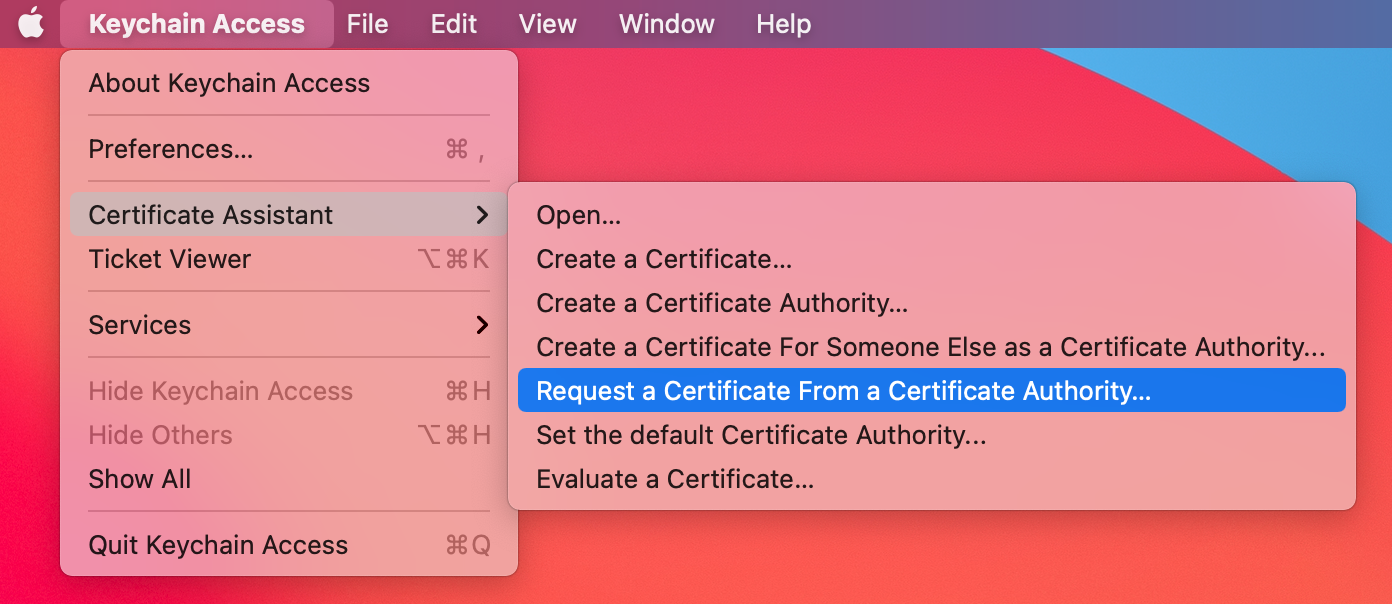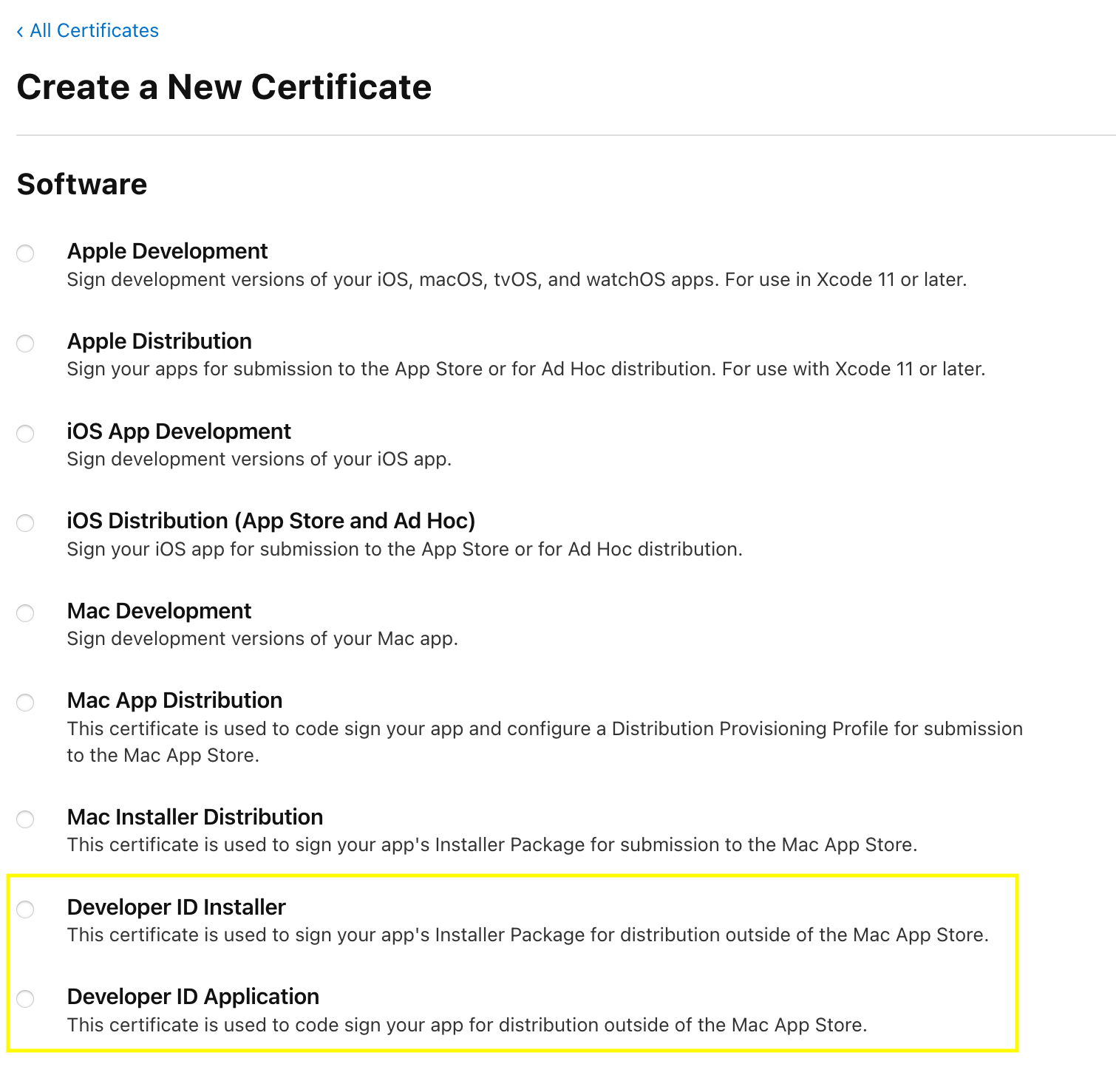Notarize and Package a command-line app on macOS app
Why?
Apple notarize:
Beginning in macOS 10.15, all software built after June 1, 2019, and distributed with Developer ID must be notarized.
Enabling the ‘Hardened Runtime’ will be requirement for successful notarization starting January 2020.
What you need
- 2 x
Code Signing certificatesfrom https://developer.apple.com - 1 x
App-specific-passwordsfrom https://appleid.apple.com/ - 1 x
Certificate Signing RequestfromKeyChain - Help to notarize or automated tool
Prepare to Notarize
Summary of preparation required
From a paid developer account or Enterprise account on https://developer.apple.com:
- Create a
Developer ID Applicationfor signing the binary - Create a
Developer ID Installerfor signing the package [that contains the binary]. - Sign the same
Certificate Signing Request
Download and install into keyChain.
Request a Certificate From a Certificate Authority
Login to developer.apple.com
Create two certificates
Sign each Certificate with the Certificate Signing Request
Login to appleid.apple.com
Request an app-specific password.
Copy the value into KeyChain. Create a New Password Item in Keychain with the following fields:
Keychain Item NameDeveloper-altoolAccount Nameapple developer account emailPasswordthe new application-specific password
Ready to Notarize
List the code signing certificate from KeyChain
security find-identity -p basic -v
5) 629......005A5 "Developer ID Installer: Mickey Mouse (U8.......)"
6) 79F......C0126 "Developer ID Application: Mickey Mouse (U8.......)"Copy the 40 character identifiers for the downloaded certificates. Also note the Team ID. The Team ID ( U8...) is a 10 character GUID.
Set environment variables
export APP_DEV_ID=<Developer ID Application>
export PKG_DEV_ID=<Developer ID Installer>
export BUNDLE_ID="com.rusty.notarizetest"
export INSTALL_LOC="/usr/local/bin"
export APPLE_USERNAME=<email>
export TEAM_ID=<>
export FOO_APP="foo"
export FOO_PKG=${FOO_APP}.pkgVerify whether the app is code signed
codesign --verify ${FOO_APP} --verbose
Add entitlements
Create an empty macOS command line app and add the entitlements required. Copy that entitlements file. https://github.com/electron/electron-notarize suggests you needd some entitlements:
com.apple.security.cs.allow-jit
com.apple.security.cs.allow-unsigned-executable-memorySign the binary with Entitlements + App Hardening
The runtime flag is required for the notarization to pass.
codesign --entitlements cli_empty_macos.entitlements --force --options runtime --timestamp --sign ${APP_DEV_ID} ${FOO_APP}
foo-cli: valid on disk
foo-cli: satisfies its Designated RequirementAdd the code into a Package file
pkgbuild --root ~/src \
--identifier ${BUNDLE_ID} \
--version "1.0" \
--install-location ${INSTALL_LOC} \
--sign ${PKG_DEV_ID} \
${FOO_PKG}Verify package was signed correctly
pkgutil --check-signature ${FOO_PKG}
Submit for notarization
xcrun altool --notarize-app \
--primary-bundle-id ${BUNDLE_ID} \
--username ${APPLE_USERNAME} \
--password "@keychain:Developer-altool" \
--asc-provider ${TEAM_ID} \
--file ${FOO_PKG}Check the Apple response and export REQUEST_ID=<big long string>.
check status
xcrun altool --notarization-info ${REQUEST_ID} \
--username ${APPLE_USERNAME} \
--password "@keychain:Developer-altool" Final step - staple the ticket to package
After a success email, you can staple the notarization to the package:
xcrun stapler staple ${FOO_PKG}
Processing: foo-cli1.0.pkg
The staple and validate action worked!Hurdles
When I tried a zip file, I would constantly hit the following error. I moved to pkg and no error:
ITMS-90728: Invalid File Contents - The contents of the file foo.zip do not match the extension. Verify that the contents of the file are valid for the extension and upload again.
The following error file was down to missing the pkgbuild step [ which signs the package or zip ]:
{
"logFormatVersion": 1,
"jobId": ".....",
"status": "Invalid",
"statusSummary": "Archive contains critical validation errors",
"statusCode": 4000,
"archiveFilename": "foo.zip",
"uploadDate": "2021-03-15T16:19:39Z",
"sha256": "....",
"ticketContents": null,
"issues": [
{
"severity": "error",
"code": null,
"path": "foo.zip/usr/local/bin/foo",
"message": "The binary is not signed with a valid Developer ID certificate.",
"docUrl": null,
"architecture": "x86_64"
},
{
"severity": "error",
"code": null,
"path": "foo.zip/usr/local/bin/foo",
"message": "The signature does not include a secure timestamp.",
"docUrl": null,
"architecture": "x86_64"
},
{
"severity": "error",
"code": null,
"path": "foo.zip/usr/local/bin/foo",
"message": "The executable does not have the hardened runtime enabled.",
"docUrl": null,
"architecture": "x86_64"
}
]
}Remove apple's Security attribute on app
You don't have to do any of this. But this is not a pro choice, if the command line tool is going beyond your control:
xattr -d com.apple.quarantine




